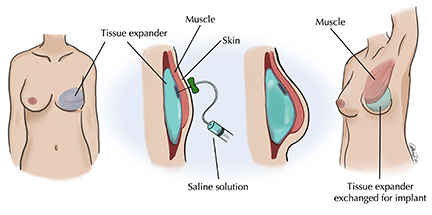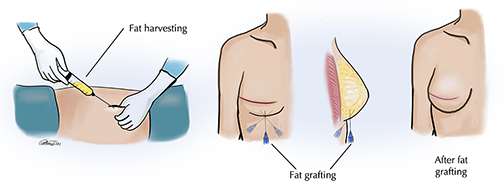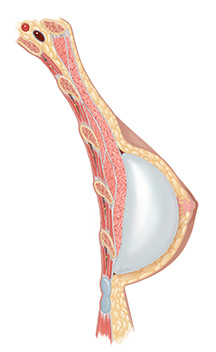Tissue Expander & Implant Reconstruction
Breast reconstruction with implants can involve multiple different types of procedures. Typically, these procedures are performed in two-stages. In the 1st stage, a tissue expander is placed at the same time as your mastectomy. A tissue expander is a temporary implant that has a special port that allows expansion of the device (like filling up a water balloon) using a small needle that is inserted through the skin. This expansion is typically performed in the office around 2 weeks after your surgery, and continues for a few weeks until your desired size is reached. This process allows for gradual stretching of the skin and increasing volume while allowing the overlying tissue to heal.

In these cases, a smaller 2nd surgery is required (typically 3 months after your mastectomy if you do not receive radiation) to remove the temporary expander and place a permanent implant. This is called “Implant Exchange” and patients typically go home the same day after this surgery. At the same time, additional techniques can be used to improve the appearance of your reconstruction such as fat grafting (diagram below). Fat grafting used liposuction (usually from the abdomen, flanks and/or thighs) to harvest fat which is then injected around the implant to improve contour and shape. Additionally, if you have had a unilateral (one-sided) mastectomy and reconstruction, a procedure can be performed on the opposite breast at the time of implant exchange (such as a breast lift or breast reduction).

There are several additional considerations when undergoing implant-based reconstruction (either tissue-expander or immediate implant). These include the “plane” of implant placement, incision placement, and use of adjunctive materials. Different implant planes include 1. Above the muscle (Prepectoral reconstruction – pictured below), 2. Partially below the muscle (Dual-plane reconstruction) or 3. Completely below the muscle (Total submuscular reconstruction). Your plastic surgeon can advise you regarding the appropriate technique for you, as well as the risks and complications.

For more information or consultation, please call our clinic at 916-734-7844.
